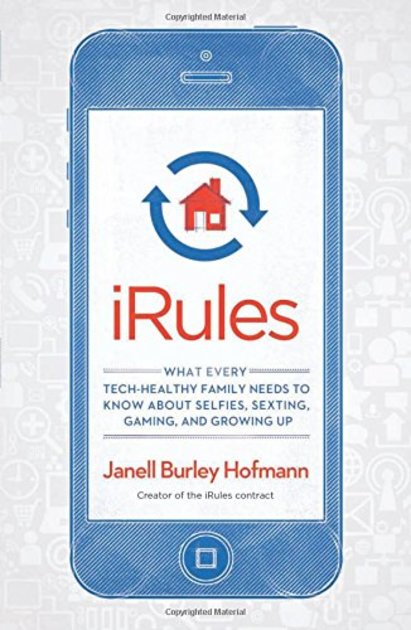
Originally published Queens Jewish Link 2016
iRules: What Every Tech-Healthy Family Needs to Know About Selfies, Sexting, Gaming, and Growing Up. by Janell Burley Hofmann
This book will help you - be aware of the concerns involving parenting electronics
- educate and discuss with your children about staying safe and healthy in the era of electronics
iRules is a readable and practical guide for parents on children's use of technology written by a wise mother of five. Hofmann created a set of rules for her son when she first gave him a smartphone, which then went viral on Huffington Post. Parents seem to have been thirsting for a way to manage the explosion of technology in their families. This book gives a healthy view on how to balance children's lives and technology.
Current statistics show that children as young as two years old are on electronics more than two hours a day. Teens are on electronics for 10+ hours a day. Children may get their first phones at as young as seven years old. Many parents of current teens have not grown up with electronics and therefore aren't fluent in the language and culture of the internet and social media. This is an intense generation gap, when you look at how past children versus current children have spent their time. Parents may get overwhelmed by the enormousness of the internet and its constant changes. However, it is essential to stay abreast of this world so that you can have enough knowledge to understand what your children may be doing and what are the concerns. Hofmann has suggestions for how to discuss meaningfully with your child when they do something concerning or break the rules, in a way that is respectful and humanistic while still maintaining authority.
Safety in the internet world is top priority and Hofmann shows parents how to be involved without overdoing it. This book provoked a thoughtful discussion in my family about balancing teens' privacy and safety in the era of electronics. My parenting style in general leans more towards support instead of intervention, and letting kids figure things out for themselves. However, with the internet world, I believe more oversight is necessary. Firstly, because it is such a new arena for parents and children, and also because there is no outside way to know what is going on, unlike school or the neighborhood. Social media is completely inside a person's phone or accounts, and if you don't have access to those, you will not have a clue. Think about it: You wouldn't send your child to school, where they spend the majority of their day, without knowing at least some details about the environment and staff. There are parent-teacher conferences and report cards so that you get periodic information on your child. Likewise, you wouldn't use a babysitter without making sure your children will be well-taken care of. Of course, getting too involved and watching over every detail may prevent a child from learning how to advocate for themselves and solve their own problems. Children and teens may resist having limits around electronics, but just like with everything else, that is the parents' job: to set healthy limits while also letting them encounter the world and learn through experience. This is why Hofmann's rules include allowing her access to all passwords so that she can spot-check her son's internet whereabouts and behavior.
Hofmann does not want electronics to rule her children's lives. Her rules include ways for her children to limit how electronics are in their lives, by encouraging them to leave electronics behind at times and engage in the world fully-- for example, constantly recording, posting, taking pictures instead of experiencing the moment. Additionally, she expects the phone back nightly so that it is not being used all night, which is a frequent issue with current teens and interferes with sleep. Hofmann also delineates electronic etiquette, such as expecting her son to answer when she calls, and explaining that he may not use it to insult or bully others.
"Rule One: It is my phone. I bought it. I pay for it. I am loaning it to you. Aren't I the greatest? Rule Eighteen: You will mess up. I will take away your phone. We will sit down and talk about it. We will start all over again. You and I, we are always learning. I am on your team. We are in this together." These first and last rules in her contract epitomize Hofmann's parenting perspective: She has expectations of her son, its not his to do whatever he wants indiscriminately, she believes that she has the ultimate authority, but she also puts a lot of love and gentle learning and room for mistakes and learning from them. They are a testament to Hofmann's close and respectful relationship with her son. You can use Hofmann's rules as an example to guide to towards similar or different ones that make sense for your family and their electronic use.
 Previous
Previous

